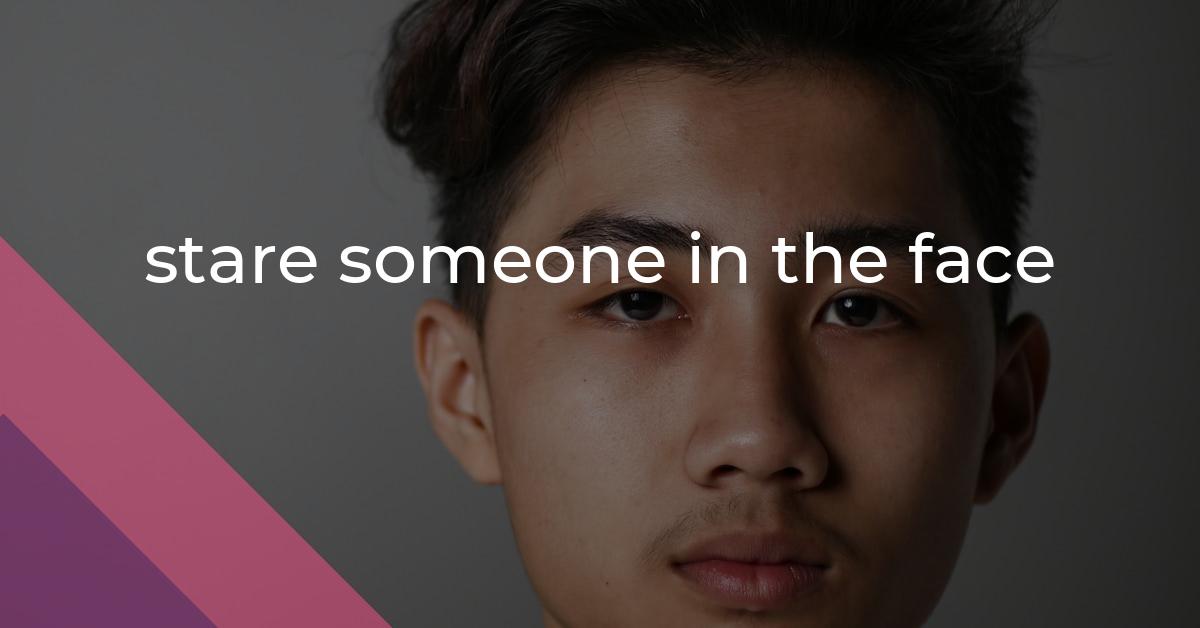stare someone in the face: Idiom Meaning and Origin
What does ‘stare someone in the face’ mean?
The idiom "stare someone in the face" means to confront or face a difficult or uncomfortable truth directly, without avoiding it. It implies looking someone or something directly in the eye, without flinching or turning away.

Idiom Explorer
The idiom "take the bull by the horns" means to confront or address a difficult or challenging situation head-on, without fear or hesitation. It implies to directly tackle a problem instead of avoiding it or waiting for someone else to do so.
The idiom "straight face" means to keep a serious or expressionless demeanor, hiding any signs of amusement or emotion.
The idiom "stop someone in their tracks" means to halt or interrupt someone suddenly, causing them to pause or cease their current action or thought. This expression implies a strong, unexpected impact or surprise that prevents further progress or movement.
The idiom "stink eye" refers to a disapproving or scornful look, often accompanied by a glare or intense gaze. It is typically used to convey strong negative emotions or to show extreme contempt or displeasure towards someone or something.
The idiom "stick one's head in the sand" means to ignore or refuse to acknowledge a problem or unpleasant situation, often out of fear or denial.
The idiom "stick it to" means to take revenge or get back at someone by giving them a difficult or unpleasant experience. It implies confronting and defeating someone in a confrontational or powerful manner.
The idiom "steely-eyed" means to have a determined and focused gaze, typically indicating resolve, determination, or intensity.
The idiom "steal a glance" means to quickly and discreetly look at something or someone, often when it is not socially acceptable or appropriate to do so.
A "staredown" refers to a tense and intense situation where two individuals engage in a nonverbal contest, trying to intimidate or gain dominance over one another, by maintaining eye contact without blinking or looking away.
The idiom "stand tall" means to be confident and proud, especially in the face of adversity or criticism.
The Untold Truth
The idiom "stare someone in the face" is a commonly used phrase in the English language. It carries a figurative meaning that is often used to indicate a situation where something is blatantly obvious or difficult to ignore. The origins of this idiom can be traced back to the late 19th century.
One possible explanation for the origin of this idiom is related to the nature of human interaction. When someone stares directly at another person's face, it is an intense and undeniable act of attention. This intense act of attention can be associated with confrontation or confrontation, making it difficult for the person being stared at to ignore. Therefore, this idiom may have evolved as a metaphorical expression of this direct and unignorable attention. It's like someone is right in your face, making it impossible to look away.
Another possible explanation for the origin of this idiom is related to the visual cues that can be gleaned from staring directly at someone's face. The face is one of the most expressive parts of the body, capable of conveying a wide range of emotions and thoughts. By looking someone in the face, you can gather a plethora of information about their reactions, intentions, and even truths. Therefore, this idiom may have developed as a way to symbolize the act of observing someone so closely that the truth becomes unmistakable. It's like the truth is right there in their face, impossible to ignore.
Furthermore, this idiom may also have connections to the concept of honesty and sincerity. When someone stares another person in the face, it can be seen as a sign of transparency and openness. By looking someone directly in the face, you imply that you have nothing to hide and are being completely honest. Therefore, this idiom may have originated as a way to express the notion of facing the truth head-on and being honest about it. It's like facing the truth right in your face and not shying away from it.
The idiom "stare someone in the face" has both literal and figurative meanings. It originated in the late 19th century and has since become a widely used expression to convey the idea of something being blatantly obvious or difficult to ignore. The origins of the idiom can be associated with intense attention, visual cues, and the concepts of confrontation, truth, and honesty. Through its usage, this idiom highlights the power of direct observation and the challenges of facing the truth. As a result, it remains an enduring and relevant phrase in the English language, reminding us of the importance of acknowledging and confronting reality.
Example usage
Examples of how the idiom "stare someone in the face" can be used in a sentence:
- He failed to see the opportunity that was staring him in the face.
- The answer to the problem was staring her in the face, but she couldn't see it.
- Despite the evidence staring them in the face, the jury still acquitted the suspect.
More "Expression" idioms



